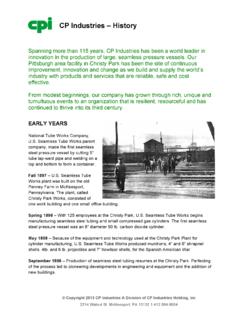Transcription of Germany 1918-39 Revision Guide - acleacademy.co.uk
1 Created by CBO Acle history department Germany Revision Guide 2017 Page 1 of 28 Germany 1918-39 Revision Guide Created by CBO Acle history department Germany Revision Guide 2017 Page 2 of 28 Exam Structure & Timings Question format; allocated marks & suggested timings. Q1 (a). What can you learn from Source A 4 marks (6mins) One supported inference Source A it Q1 (b). Describe the key features 6 marks (8 mins) Two developed (factually detailed) statements One key Another key Q1 (c). Explain the effects(consequences) 8 marks (12mins) Two or three well developed statements showing links between each one One effect of .. Another effect A third effect Q1 (d) Explain why (reasons for).. 8 marks (12mins) Two or three well developed statements and prioritise One reason.
2 Another A third However the main Q2 Answer EITHER (a) OR (b) a) Explain 8 marks (12mins) b) Explain Q3 Answer EITHER (a) OR (b) 16 marks + 4 SPaG a) Was the main reason (25mins) Use the following in your answer: gives two factors you MUST add another b) Was the main effect Use the following in your answer: gives two factors you MUST add another Develop each factor with as much detailed/relevant factual detail as possible. Try to show links between each factor and prioritise (prioritise means to show why one factor was more important/significant than the other two) The timings shown are approximate. Make sure you have sufficient time for the last question. Created by CBO Acle history department Germany Revision Guide 2017 Page 3 of 28 Germany exam from June 2015 Question 1 you must answer all parts of this question.
3 Study Source A. Source A: From a modern world history textbook, published in 1999. In 1925, Hitler persuaded the German government to lift the ban on the Nazi Party and set about reorganising it. However, he then made a speech that was so critical of the government that he was banned from public speaking for two years. Nevertheless, by the end of 1926, the Nazi Party had 50,000 members and had become a nationally-known party. But in the 1928 election, the Nazis won just 12 seats and were only the eighth-largest party in Germany . (a) What can you learn from Source A about the development of the Nazi Party in the years 1925 28? (4) (b) Describe the key features of the French occupation of the Ruhr in 1923. (6) (c) Explain the effects of Stresemann s foreign policy on Germany in the years 1924 29. (8) d) Explain why the Nazis wanted to control education and youth movements in the years 1933 39.
4 (8) EITHER 2 (a) Explain how culture and the arts changed in Germany in the years 1933 39. (8) OR 2 (b) Explain how Nazi policies towards the Churches in Germany changed in the years 1933 39. (8) EITHER 3 (a) Was the Munich Putsch the most threatening uprising faced by the Weimar Republic in the years 1919 23? Explain your answer. (16) You may use the following in your answer. The Munich Putsch The Spartacist uprising You must also include information of your own. OR 3 (b) Was the Great Depression the main reason why Hitler became Chancellor of Germany in January 1933? Explain your answer. (16) You may use the following in your answer. The Great Depression The role of the Sturmabteilung (SA) You must also include information of your own. (Total for spelling, punctuation and grammar = 4 marks) (Total for Question 3 = 20 marks) Created by CBO Acle history department Germany Revision Guide 2017 Page 4 of 28 Weimar Germany 1919-1933 The end of WWI Germany was in a very poor state: the blockade of Germany had lead to a lack of food and supplies.
5 People were starving. Riots were breaking out. The navy had mutinied (rebelled) against the Kaiser (king of Germany ). Kaiser WilhelmII realised the situation was hopeless and abdicated (quit his job) November 9th, 1918. Germany was left without a leader and in a mess. Many people in Germany liked the strong autocratic leadership of the Kaiser, they were used to it. Many were not going to like the weak and indecisive governments formed during the Weimar Republic (1919-1933) which were coalition governments often made up with as many as 9 different parties. The biggest political party in Germany was the Social Democrats. Their leader, Friedrich Ebert, (first president of the Weimar Republic) took on the job of running Germany . He tried to improve people s lives by giving them better working conditions and freedom of speech. Politicians had to flee Berlin because of the many uprisings on the streets. They went to Weimar where the new constitution (laws by which Germany would be governed) was created and the new government, a democratic one was formed.
6 It became the Weimar Republic. Political Unrest: streets of Germany (and especially the capital Berlin) were full of angry mobs. Communists who were inspired by the revolution in Russia, and Nationalists who were angry at the betrayal by the November Criminals the politicians who had signed the armistice agreeing to Germany s surrender. Freikorps were ex-soldiers who felt they had been stabbed in the back (Dolchstoss) by the Weimar politicians they wanted strong leadership, not what they saw as weak democracy. Economically Germany was virtually bankrupt after WWI; cost of war; war pensions to 600,000 war widows; banks & businesses bankrupt; rising unemployment. Social problems divides between the rich & poor were growing; workers angry at industrialists who profited from the war whilst they were starving; people saw working women as a bad sign of the breakup of the traditional German society. Germany was in turmoil.
7 Created by CBO Acle history department Germany Revision Guide 2017 Page 5 of 28 The Spartacist Revolution January 1919 In January 1919, the German communist party (the Spartacists) decided that they wanted to take over Germany from Ebert. They started a revolution attempt on 6 January. It was not successful in a week, Ebert with the help of his Freikorps (ex-WWI soldiers paid to help the government keep order) had stopped the rebellion and killed many communists. The Spartacist leaders, Rosa Luxemburg and Karl Liebnecht, were murdered. It was helpful for Ebert that the Spartacists were no longer a threat. However, he had to rely on the Freikorps to keep order that made him look weak to the public, and it was risky as the Freikorps could turn on him at any point. The Freikorp helped Ebert only because they hated communism more than they hated the Weimar politicians.
8 The Weimar Constitution The Social Democrats won the January 1919 elections. They held the first meeting of their new government in a town called Weimar and got the nickname The Weimar Government . Their first job was to write a new constitution (set of rules) for Germany . Their new rules included: everyone over the age of 20 could vote, people voted for MPs who would sit in the Reichstag, the Reichstag would suggest and vote on new laws, the Chancellor would be head of the Reichstag and would be voted for every 4 years, there would be a President who would choose the Chancellor and keep control of the army and he would be voted for every 7 years. Strengths of the Weimar Constitution Weaknesses of the Weimar Constitution Very fair, particularly the voting Allowed lots of people to have their say State governments would ensure local issues were addressed Wouldn t allow one person to take over the Chancellor and President balanced each other A poor Chancellor or President would only be around for a limited time Proportional Representation meant that there were loads of different parties in the Reichstag it was difficult to get them to agree on anything Article 48 could be abused so that the President stopped listening to the Reichstag State governments could pass laws that went against what the Reichstag wanted The Treaty of Versailles June 1919 Created by CBO Acle history department Germany Revision Guide 2017 Page 6 of 28 This punished Germany by giving them the war guilt.
9 Making them pay billion in reparations, reducing their army to 100,000 men, taking away their tanks, submarines and planes, taking 13% of their land and of their population away, taking all their overseas colonies, demilitarising the Rhineland (border with France) and forbidding them from uniting with Austria (Anschluss). The Germans were outraged. They called the Treaty a diktat (dictated peace) and accused the Weimar Government of stabbing them in the back by agreeing to such harsh terms. People began to look to other politicians to rule Germany better than the Social Democrats. Mnemonic for remembering the terms of the Treaty of Versailles: GARGLE: G=Guilt Germany must accept War Guilt, responsibility for WWI A=Army Germany s army reduced to 100,000 men; no air force; only 6 battleships R=Reparations Germany was given a war fine of billion (mainly to paid to France and Belgium G=German land Germany had to give back land Alsace & Lorraine to the French; lost 13% of land and approx.)
10 12% of the German population Were now outside Germany Le= League of Nations Peace keeping organisation was set up to ensure that war on such a scale was avoided. Germany were prevented from joining. Many people in Germany , especially the Nationalists (right wing) were very angry with the Weimar Republic politicians for the following reasons: They signed the armistice (surrender the war which meant Germany was defeated) They were seen as weak They signed the Treaty of Versailles which left Germany very vulnerable Other opposition to the Weimar Government The German communists continued to create riots around Germany , even after the Spartacist Revolution failed. Freikorps had to be sent round to fight them and stop them. The right wing also hated the Social Democrats. The Freikorps themselves went against Ebert in 1920 when they supported Wolfgang Kapp in his attempt to take over the country (Kapp Putsch).





